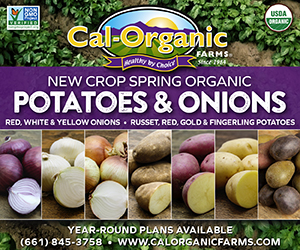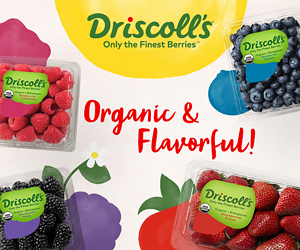Hunter Francis founded and directs the Center for Sustainability, an interdisciplinary unit within Cal Poly San Luis Obispo’s College of Agriculture, Food and Environmental Sciences. The Center is actively involved in the coordination of events, lectures, curriculum development, grant writing, fundraising, outreach, community organizing and provision of resources to students, educators, farmers, entrepreneurs and policy makers.
OPN: Please share a little about yourself, your background and your pathway to Cal Poly.
I came from the East Coast with a degree in international relations (Tufts) - and without much agricultural background, although my first job at 14 was picking strawberries in Upstate New York. After college, I became involved in the natural foods movement and was even a macrobiotic chef for a short time. That drew me into the environmental movement and because of my appreciation for food, I quickly found organics. I came to Cal Poly to do a masters in soil science because I wanted to have a more scientific grounding for my interests.
OPN: Walk us through the evolution of the Center for Sustainability. What were the underlyng forces that influenced the formation of this Center?
Once at Cal Poly, I discovered a one-acre certified organic parcel that at the time was home to a permaculture initiative. A group of students interested in ecological agriculture coalesced around it, and when the permaculture program ended, we decided that the college needed some sort of entity to foster organic and sustainable approaches. We formed an informal program for sustainable agriculture that laid the foundation for the current center and that was instrumental in expanding the organic acreage (now 10 acres) and in hosting scores of classes, workshops and conferences on a wide range of related topics with the help of sympathetic faculty and administrators. It was a very “organic” (grassroots) evolution and was a natural response to growing interest. Eventually, funding and recognition followed what began as a volunteer effort. The timing of it all synchronized well with the “mainstreaming” of organics.
OPN: In your tenure at Cal Poly you have shepherded many students through your program. How has the make-up of these students changed from 20 years ago and how will this change in the next 20 years?
I have always felt honored that our students have been among Cal Poly’s most forward-thinking, and in my opinion, the cream of our crop. Our programs have attracted a very eclectic mix of students - from all majors.
The organic program has served as a good melting pot. On the one hand, “traditional” students learn new ideas that they can take back to their farms, and on the other, the “alternative” students with no agricultural experience gain new respect for the rigors of farming.
Overall, education for organic agriculture continues to attract an increasingly broad cross-section of students.
OPN: How is Cal Poly growing the organic program? What resources is the university devoting to sustainably and organics?
The College of Agriculture recently hired a new faculty member, Dr. Ashraf Tubeileh, devoted specifically to overseeing the organic agriculture program here - thanks in part to seed funding from Lundberg Family Farms. Ashraf’s teaching and research will build upon the foundation that we laid at the organic farm and through our Sustainable Agriculture Minor, which includes courses dedicated to organic. I should add that there has been an explicit attempt to strengthen our soil science program, with several new soil ecologists now on board.
OPN: How can the Cal Poly’s College of Agriculture, Food and Environmental Sciences, and its graduates, play a bigger role in organics, the fastest growing food category in America?
Stronger ties need to be developed with the organic industry. In an era of decreasing state funding for public universities, assistance from outside entities is vital.
Now that the organic industry is more mature, leading companies need to support educational programs that serve them. A vital exchange of young talent and ideas on the one hand, and expertise and financial resources on the other, will be mutually beneficial.
OPN: Do you have upcoming events that you can share?
A big focus of ours currently is soil health. This is being driven by the recognition that soil is an enormous carbon reservoir and that with wider adoption of sustainable practices, it has the potential to draw down atmospheric carbon while providing multiple co-benefits for agriculture. This focus has been a good opportunity to bring together our work in organics, composting, grazing practices, fertility and pest management. We are now in the process of developing a USDA-funded soil health video series.
Other events and initiatives can be found our website: cfs.calpoly.edu.






